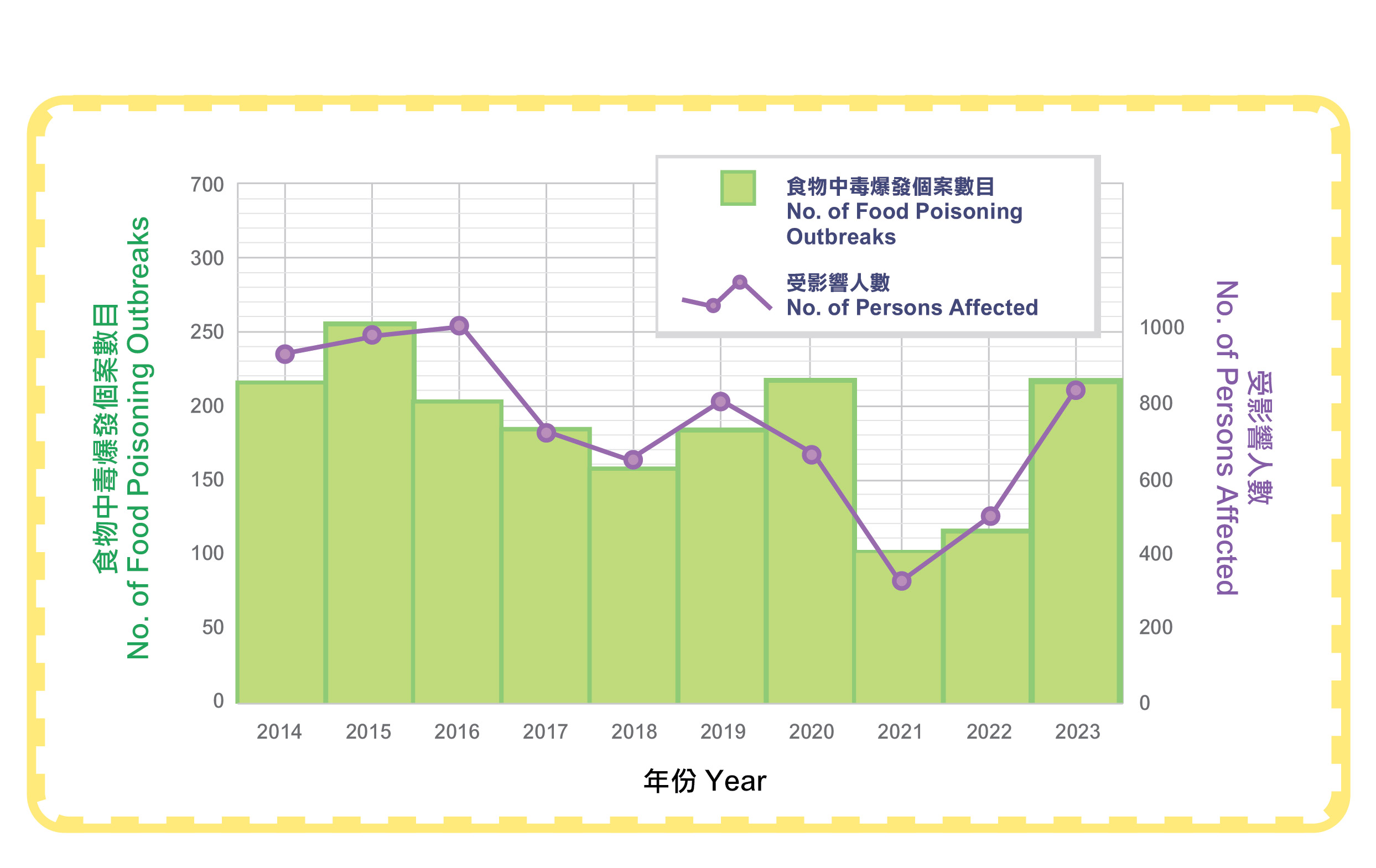
Food Safety Focus (212nd Issue, March 2024) – Article 1
Review of Food Poisoning Outbreaks Related to Food Premises and Food Business in 2023
Reported by Dr. LUI Hoi Man, Medical & Health Officer,
Risk Management Section, Centre for Food Safety
This article reviews the food poisoning outbreaks (FPOs) related to local food premises and food business reported to the Centre for Food Safety (CFS) of the Food and Environmental Hygiene Department (FEHD) in 2023.
Food Poisoning Outbreaks Related to Local Food Premises and Food Business
Food poisoning is a statutory notifiable disease in Hong Kong. To protect public health, the CFS, in collaboration with the Department of Health (DH), is responsible for the investigation and control of FPOs related to local food premises and food business.
In 2023, the CFS received 219 food poisoning cases referred by the DH, affecting 838 individuals in total (see Figure).
Figure: Number of food poisoning outbreaks related to food premises and food business and the corresponding number of persons affected from 2014 to 2023
Causative Agents and Contributing Factors
In all the food poisoning cases in 2023, bacterial foodborne agents remained the major causes (72.2% of all cases). The top three bacteria among all bacterial cases were Vibrio parahaemolyticus (31.4%), Salmonella (30.7%) and Clostridium perfringens (11.2%). Viral cases accounted for 25.7% of FPOs and all were related to norovirus. The remaining 2.7% of FPOs were related to toxins. Overall, "consumption of raw food" (22.8%), "contamination by raw food" (18.1%) and "improper food storage temperature" (16.5%) were the three most frequently found contributing factors.
Highlights on major Epi-linked Food Poisoning Outbreaks in 2023
Dessert consumption is popular among the general public. Eggs are a component of many desserts, including cheesecakes, soufflé, tiramisu and mousse. But eggs may contain Salmonella, a type of bacteria that, if ingested, can cause food poisoning.
Some chefs might not cook the desserts that include eggs thoroughly, in order to maintain a soft and creamy texture. If unpasteurised eggs are used to make desserts, there will be a higher risk of Salmonella contamination as compared with using pasteurised eggs.
In fact, in the second half of 2023, there were 8 food poisoning cases involving the use of unpasteurised eggs in making desserts. Investigations conducted by the CFS found that some food businesses used unpasteurised eggs when making desserts. Some were also found to keep desserts at inappropriate temperatures.
In order to produce desserts safely, food businesses can develop standard operating procedures (SOPs) in accordance with the following guidelines:
https://www.cfs.gov.hk/english/whatsnew/whatsnew_fst/files/safe_preparation_of_eggs_and_egg_products.pdf
Food Poisoning Outbreaks involving Norovirus and Raw Oysters
In 2023, there were 75 cases of FPOs caused by norovirus and they were all associated with the consumption of bivalves. Most of these cases (70%) happened in winter. Indeed, it has been shown in literature that there is a seasonal pattern to the norovirus detection in raw oysters. Investigations conducted by the CFS found that many of these cases involved consuming more than one type of raw oysters. The absence of valid health certificates was one of the issues found in several FPOs.
Actions taken
The CFS strives to enhance food safety in Hong Kong. The CFS took prompt action and suspended the import of relevant raw oysters. The CFS has been conducting operations to make sure the storage and handling of raw oysters at importer and vendor levels are up-to-standard.
The CFS also exchanges intelligence with international health authorities on incidents related to norovirus in raw oysters. The CFS investigates each case, and checks whether the food has been distributed locally. The CFS suspended the import of contaminated oysters accordingly.
Conclusion
Overall, the number of food poisoning outbreaks fluctuated from around 100 to 250 cases per year for the past decade. The CFS has all along been promoting the "Five Keys to Food Safety" to the public and food businesses, in order to enhance recognition of risks by the trade and the public. The trade should handle food safely. Do not reimmerse raw oysters into water. Susceptible populations including the elderly, infants and young children, pregnant women and individuals with weakened immunity should avoid consuming raw oysters.

